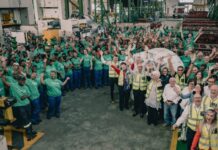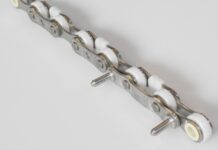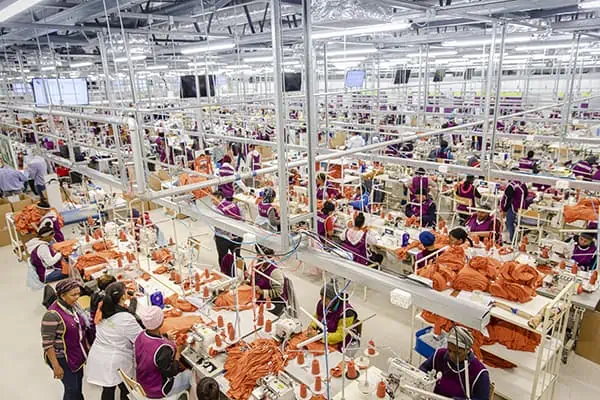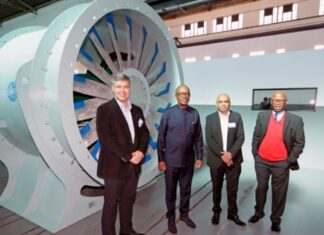By Sue Segar
IN 2008, Graham Choice, founder of Prestige Clothing and now TFG’s Managing Director of Merchandise Supply Chain, discovered an old shed containing redundant machinery in the small farming town, Caledon. He negotiated with the municipality to use it to train hundreds of unemployed people in the area.
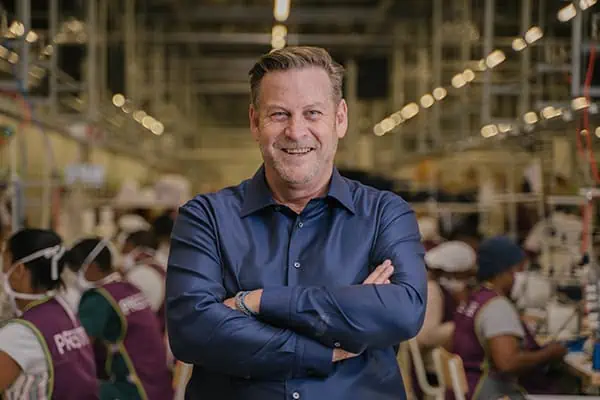
“There was human capital, waiting for opportunity,” said Choice, who had founded Prestige in 1989 and, with his Prestige Maitland factory having reached its optimum size, decided that Caledon was the perfect place to open a new clothing factory, due to the large number of unemployed women in the area and its convenient location to the N2. He started with eight people, modernised the site, made the business compliant, bought new machinery and started recruiting and training workers on site.
The factory has since expanded and TFG has built a large, modern, world-class building, which has solar panels on the roof, energy efficient machines and the site can house 1000 workers. It now competes with the agricultural sector in being the largest employer in the now flourishing town. To support the local community in the towns and villages that surround Caledon, TFG also established a transport network to allow for a greater catchment area for potential workers. “There are almost 900 young people working in the factory and the average age is 27. The Caledon factory also trains over 100 learners on a NQF Level 2 learnership a year.”
Today, this same plant – the home of Sportscene’s Redbat brand – manufactures 4,5 million garments annually. The target, by 2026, is to produce 6 million garments. The factory also produces for Markham and Foschini.
Choice emphasised that the factory, which is part of TFG’s localisation strategy, is “highly mechanised and efficient”, saying their products are “more cost efficient and on a far shorter lead time than imports from China.”
After its establishment in 1989, Prestige Clothing grew from a micro business of six people, to a large company, which TFG acquired in 2012 to establish a scalable local quick-response manufacturing supply chain. Prestige Clothing and its five plants owned by TFG are part of the R1 billion investment TFG has made into building capacity to make garments locally – a shift from the 20-year disinvestment in local clothing manufacturing by the country as a whole.
This R1bn investment has yielded great success, with substantially more locally made clothes in TFG’s stores, through Foschini, The FIX, Exact, Markham, Totalsports, and Sportscene – a far cry from the days when most stock was made in Asia because of lower costs and cheaper labour. In 2017, TFG’s new Quick Response Supply chain produced 6-million garments in South Africa; in 2023, it will produce 17-million. It plans to grow that to 24-million within the next three years. Aligned to this output, TFG will need to employ 360 people for every million garments made annually.
As part of TFG’s localisation strategy, this investment and commitment to job creation will continue. TFG Prestige Clothing factories, which are located in Maitland, Epping, Durban and Johannesburg, currently employ 4000 people with another 500 learnerships in process. TFG’s quick response supply chain also supports six independent strategic factories which employ a further 2000 people. Together, Prestige Clothing and TFG’s non-owned strategic partners and auxiliary support businesses are projected to employ over 9000 people by 2026.
“We are fortunate to be at such a scale now that we are working on rebuilding supply chain capability in support of our manufacturing strategy … to bring back and repurpose dyers, printers, embroiderers, and others that enable the garment manufacturing industry.”
The intent is to see the clothing and textile industry once again become the Western Cape’s largest employer. “There shouldn’t be an unemployed South African living in the province. There’s no village or rural town with an unemployed population that cannot become a Caledon.”
TFG has proven that building factories in impoverished areas is not impossible. The company’s thriving Prestige Clothing Hillbrow factory in Johannesburg successfully employs only deaf youth and currently employs 127 young people.
Choice states, with the ever-increasing retail demand for local goods, there’s space for a garment factory in every SA town. “We went from almost 60 – 70 percent (of clothing) coming into SA from the Far East 15 years ago, to only 17 percent coming from China today.”
It’s nonsense to believe that the South African workforce can’t compete with the best in the world! “We believe that if you provide a compliant working environment, modern tooling and manufacturing processes and effective accredited training and skills upgrade, the youth that are currently employed in so many areas in our country will become some of the most productive workers globally. The challenges that TFG has overcome and the successes achieved in working towards this, should provide a clear roadmap for others to follow.”
“A clothing factory has a job and opportunities for every unemployed South African to move up – from entry-level sweepers, loaders and box packers, to a highly skilled machine operator and eventually to senior technical and managerial roles.”

